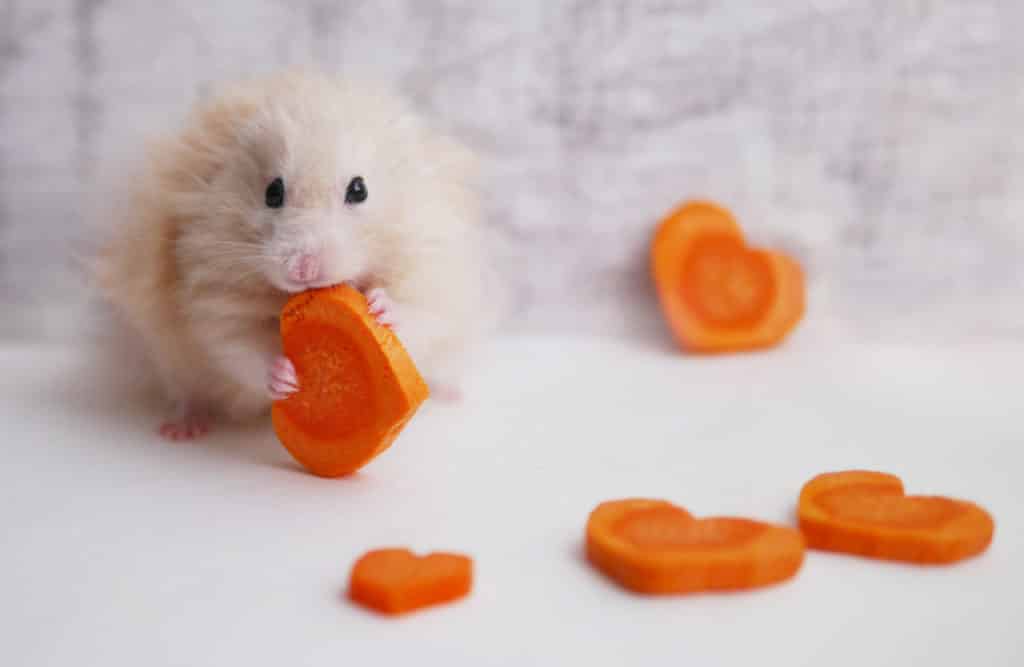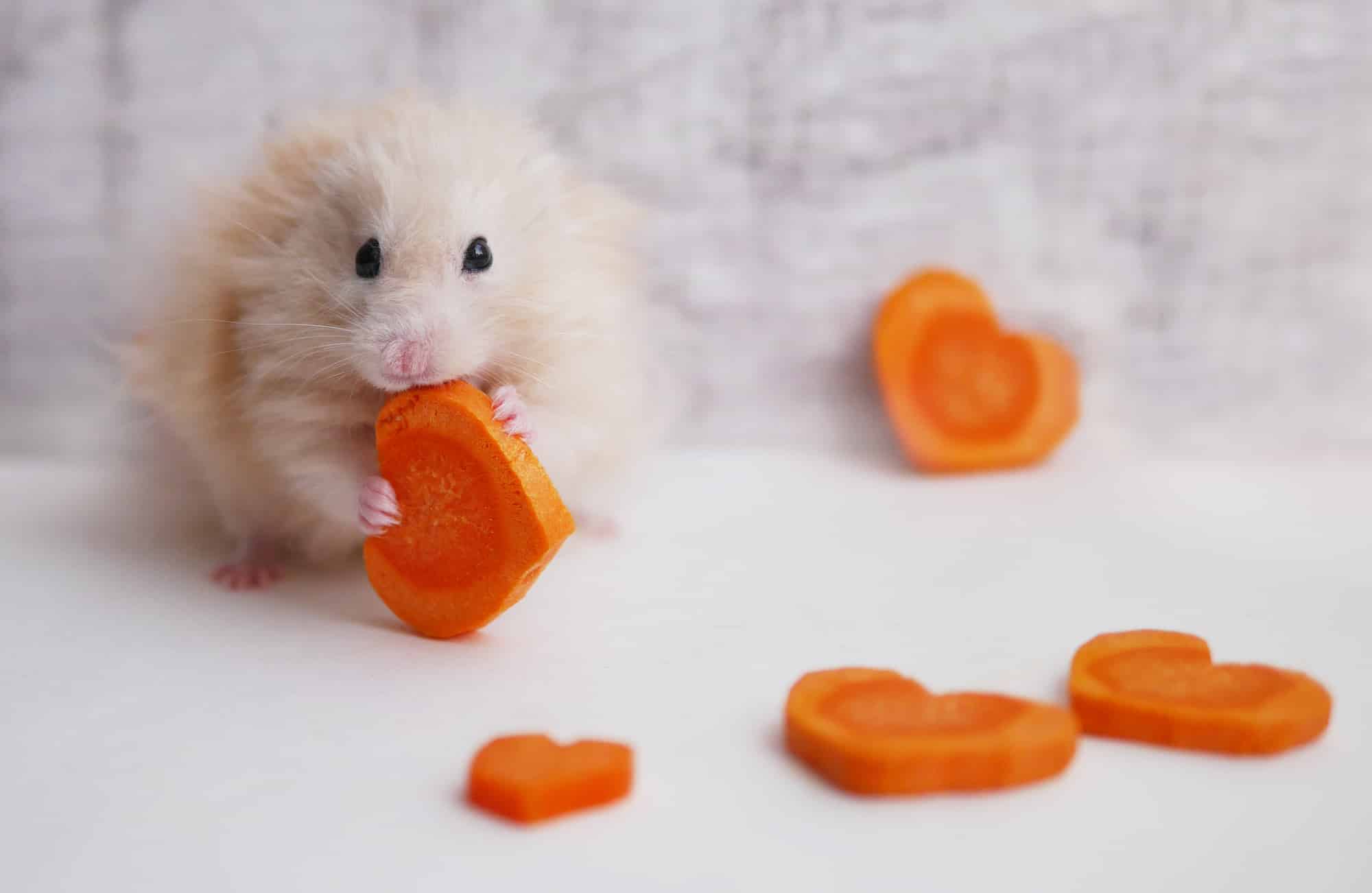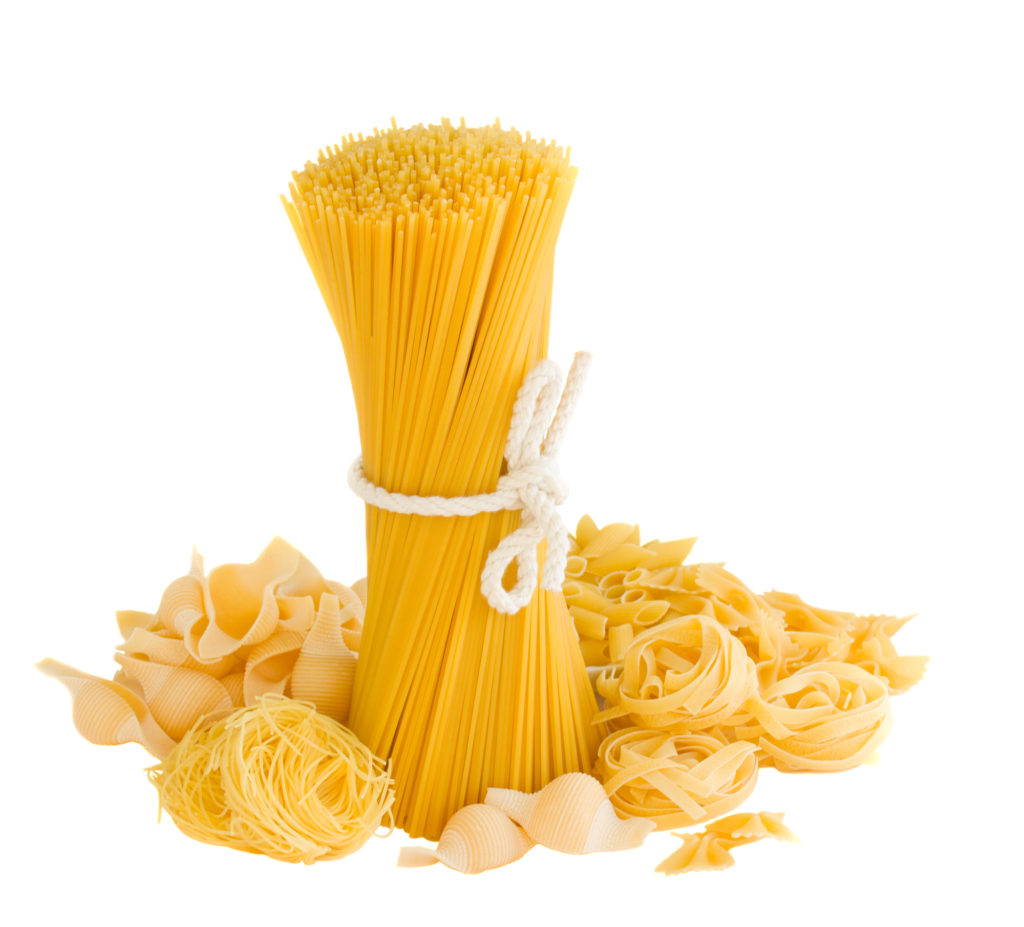There is no doubt that carrots are a superfood. They are crunchy, tasty, highly nutritious, and can be added to various dishes. Even Bugs Bunny loves carrots. But are carrots safe for hamsters? Can hamsters eat carrots? What are the health benefits carrots offer to hamsters, and what are the risks you should know about? How many carrots can your hamster eat? Read this blog post and find out.
- The nutritional content of carrots
- Can hamsters have carrots? Are carrots safe for hamsters?
- Different breeds of hamsters vs. carrots
- FAQ
- Can hamsters eat carrots every day?
- Can hamsters eat raw carrots?
- Can hamsters eat cooked carrots?
- Raw vs. Cooked carrots – Which is better?
- Can hamsters eat carrot tops?
- Can hamsters eat carrot peel?
- Can hamsters eat baby carrots?
- Can baby hamsters eat carrots?
- Can carrots treat your hamster's teeth problems?
- Can carrots treat your hamster's hair fall?
- Are hamsters allergic to carrots?
- How to introduce carrots into your hamster's diet?
- Fun Facts
- Summary – Key Takeaways
The nutritional content of carrots
The nutrients in 100g of carrots are listed below:
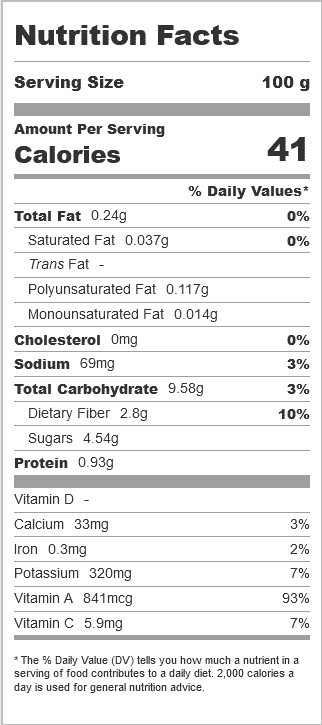
Can hamsters have carrots? Are carrots safe for hamsters?
Carrots are not toxic for hamsters. So, they can eat them. The health benefits of carrots are listed below:

1. Carrots are a water-rich food. The water content in carrots ranges from 86 to 95%. So, they can keep your hamster hydrated.
2. 100g of carrots contain about 9.6g of carbohydrates. Of these, 2.8g are fibers, and the rest are sugars, i.e., only 7% of carrots are sugars. So, the Glycemic Index of raw carrots is only 16, which is considered pretty low. Glycemic index (GI) measures the likelihood of a food item to increase blood sugar levels. Any GI value less than 55 is considered very low. Since the GI of carrots is only 16, they don’t spike blood sugar levels quickly. Thus, they protect your hamster from diabetes.
3. Moreover, carrots are a low-calorie, fat-free fresh food. 100g of carrots contains only 40 calories and 0.24g of fats. Hence, they protect your hamster from obesity.
4. Dietary fiber is the part of fruits and vegetables that cannot be digested by the body. Dietary fiber can be divided into two types – Soluble fiber, which is soluble in water, and Insoluble fiber, which is not soluble in water. Carrots contain almost equal amounts of soluble and insoluble fiber (Source: Healthline). The soluble fiber that is abundant in carrots is pectin. It draws water from the digestive tract and creates a gel, which slows down digestion (Source: Healthfully). So, your hamster’s body cannot absorb carbohydrates rapidly, and hence, his glucose levels become stable. Thus, carrot protects your hamster from diabetes. Soluble fibers also promote the growth of good bacteria in the gut, thereby promoting gastrointestinal health.
5. The insoluble fibers abundant in carrots are cellulose, hemicellulose, and lignin. They attract water into your hamster’s stool, thus, making it softer and easier to pass without much strain. Hence, carrots promote bowel health and regularity.
6. An Experiment on rats has shown that the soluble fibers and antioxidants present in carrots reduce the absorption of cholesterol in the digestive tract (Source: PubMed). Thus, they reduce the cholesterol levels in rats and improve their cardiovascular health. As hamsters, too, are rodents, carrots could have a similar effect on your hamster as well.
7. When we were kids, our parents pushed us to eat carrots because they believed carrots could improve vision. Well, their belief was not ill-founded. Carrot contains high amounts of beta-carotene, which can be converted to vitamin A by the body of mammals. It contains alpha-carotene too, which can also be partly converted to vitamin A. Vitamin A is an essential vitamin that your hamster needs. Vitamin A improves your hamster’s vision and immune system. It keeps your hamster’s skin and hair healthy.
8. The beta-carotene and alpha-carotene present in carrots are also excellent antioxidants. Antioxidants are chemicals that protect the body from damage by free radicals. Free radicals are produced inside the body during some important body functions. These molecules are unstable and need electrons to become stable. So, they steal these electrons from body cells, membranes, and DNA, causing damage to the body, sometimes even causing cancer. Antioxidants provide electrons to free radicals before they can damage the body and neutralize them, making them harmless. So, antioxidants can slow down aging and protect your hamster from diseases like cancer.
9. Carrots also contain other antioxidants like lutein, lycopene, polyacetylenes, and anthocyanins (Source: Healthline). Lutein is an antioxidant that yellow and orange carrots. It protects the eyes from damage by free radicals. Lycopene is an antioxidant found in red and purple carrots. It inhibits the growth of cancer cells (Source: PubMed). An experiment on hamsters shows that lycopene can protect your hamster from buccal pouch cancer (Source: PubMed). Polyacetylenes are antioxidants that might protect your hamster from tumors and cancers (Source: PubMed). Anthocyanins are antioxidants that are found in purple and other dark-colored carrots. Besides carrots, they are also found in purple asparagus (Recommended reading: Can hamsters eat asparagus?). Anthocyanins reduce blood pressure and the risk of heart attack and heart diseases.
10. Besides vitamin A, carrots are also rich in other vitamins like vitamin C, vitamin K, vitamin B6, and vitamin B7. Vitamin C helps cells grow, develop, and repair themselves. It also helps the body absorb iron and improves the immune system. Vitamin K promotes blood coagulation and improves bone health. Vitamin B6 and B7 help the body synthesize and break down carbohydrates, proteins, and fats to produce energy (Source: Medical News Today).
11. Carrot also contains minerals like potassium, iron, and calcium. Potassium reduces blood pressure and plays a role in transporting nutrients and waste products from cells. Iron helps the body create red blood cells and transport oxygen from the lungs to other parts of the body. Calcium strengthens the teeth and bones of your hamster. Your hamster’s body needs a small amount of calcium for other bodily functions too.
Risks
1. Since carrot contains calcium, if your hamster eats too many carrots, he might develop kidney or bladder stones.
2. If your hamster stops eating other food items, becomes fatigued, or develops diarrhea after eating a piece of carrot, it is a sign that carrots don’t suit him. Sometimes, your hamster might also develop a condition called pica. When this happens, your hamster might start eating his bedding and other items (other than food). This indicates that your hamster has an upset stomach and is trying to soothe it (Source: Petkeen).
3. Your hamster might stove away carrots in their cheek pouches and store them in their cage for later use. So, you have to check his cage and remove any uneaten pieces of carrots. If not, your hamster might end up eating spoilt carrots that might harm his digestive system.
4. The sugars in carrots can add up over time. So, if your hamster overeats carrots, he might develop obesity and diabetes.
5. Carrot contains reasonable amounts of insoluble fiber. This attracts water to your hamster’s stools and makes them softer and easier to move. But if there is too much insoluble fiber, your hamster can suffer from diarrhea. On the other hand, if your hamster eats a lot of insoluble fiber but doesn’t drink enough water, he might suffer from constipation.
6. If your hamster overeats carrots, he won’t have any place left in his stomach for other food items, like hamster pellets. This might result in your hamster developing deficiencies in some vitamins and minerals. So, giving a balanced diet is essential.
Different breeds of hamsters vs. carrots
Carrots are one of those vegetables that hamsters can safely eat. But the amount each breed can eat varies greatly.
Can Chinese dwarf hamsters eat carrots?
Dwarf hamsters are generally very small compared to other breeds of hamsters. So, eating even a slightly higher amount of sugars than the recommended amount could make them diabetic. Therefore, even though carrots contain less than 5% sugars, several vets advise against giving carrots to dwarf hamsters because it’s easy to overfeed them accidentally. Hamsters’ tendency to store extra food in their cheek pouches and eat them later on, magnifies this problem. But carrots are incredibly healthy, too. Hence, you may not wish to completely remove them from your hamster’s diet as well. If that’s the case, give carrots as rewards when your hamster accomplishes a task instead of adding carrots to his regular diet. And even when you do so, the size of this reward should be less than 10% of your hamster’s diet.
Can Campbell dwarf hamsters eat carrots?
There are two answers to this question – yes and no. Just like Chinese hamsters, Campbell hamsters are small hamsters, too. And carrots contain moderate amounts of sugar, which can easily make Campbell hamsters diabetic and/or obese when overfed. So, if you are highly concerned about your Campbell dwarf hamster’s health, avoid carrots from his diet completely. But if you feel that your Campbell hamster should enjoy the taste of a carrot now and then, give it as an occasional treat. But the size of the carrot you give should not be more than 10% of your hamster’s diet.
Can Russian dwarf hamsters eat carrots?
Russian hamsters, also known as Winter White hamsters, are small hamsters that are prone to diabetes and obesity. So, it is better to not give carrots to Russian hamsters. But if you decide to give carrots, it should be a very small piece, less than 10% of your hamster’s diet.
Can Roborovski hamsters eat carrots?
Robo hamsters are the smallest species of hamsters. But they are also the most active species of pet hamsters. They run a lot, when compared to other pet hamsters. Indeed, they keep running most of the time when they are awake. So, they can digest more sugars when compared to other pet hamsters. Therefore, you can give them a small piece of carrot (at most an inch in size) once in two days.
Can Syrian hamsters eat carrots?
Yes, Syrian hamsters can eat carrots. And since they are the largest breed of hamsters, they can eat much more than the other breeds. So, you can give your Syrian hamster a small piece of carrot every two days. This piece can be at most two inches in size (Source: Just hamsters).
FAQ
Can hamsters eat carrots every day?
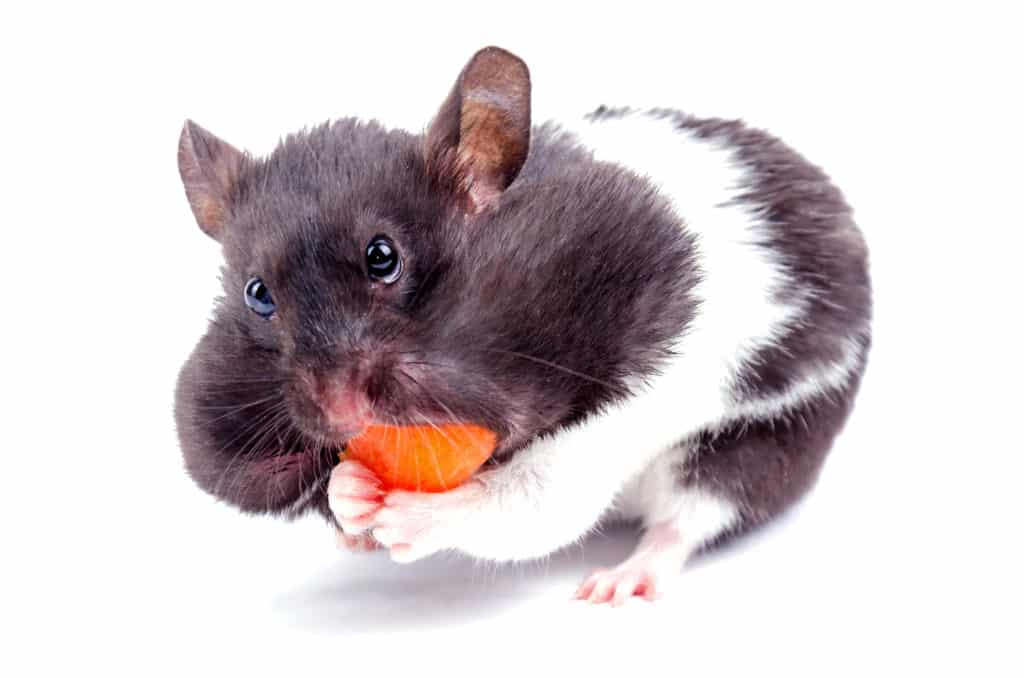
Carrots are almost 5% sugars. There are a lot of vegetables and fruits that have less sugar than carrots. So, hamsters (particularly dwarf hamsters) don’t need to eat carrots to stay healthy. They can get these nutrients from other food items as well. But if you decide to give carrots to your hamster, it shouldn’t be every day. After all, the sugars in carrots could easily add up and cause diabetes or obesity. Most hamster owners use carrots only as rewards when they are trying to train their hamster to do something, like running through a tube.
Can hamsters eat raw carrots?
Yes, definitely. Raw carrots offer some health benefits that cooked carrots don’t. For instance, raw carrots are crunchier and harder to chew. Therefore, they help your hamster wear down his constantly growing teeth. Raw carrots have a very low Glycemic Index of 16. This means they are less likely to raise blood sugar levels and hence prevent diabetes. So, raw carrots are a great treat for your hamster.
Can hamsters eat cooked carrots?
Yes, they can. But the Glycemic Index of cooked carrots can range from 32 – 49 (Source: WebMD).
- Low glycemic index: 1-55
- Medium glycemic index: 56-69
- High glycemic index: 70 or higher
Even though cooked carrots are still in the low Glycemic index group, their tendency to increase blood sugar levels is higher than that of raw carrots. But cooking can increase the concentration of carotenoids in carrots. But the method of cooking matters, too. Studies indicate that while boiling increased the carotenoid (which are converted to vitamin A by the body) concentration of carrots by 14%, frying decreased it by 13% (Source: Journal of Agricultural and Food Chemistry). Moreover, cooking dissolves the thick walls of cells in carrots partially. This helps the body convert more of the carotenoids present in carrots into vitamin A.
So, your hamster can eat cooked carrots because they, too, are healthy.
Raw vs. Cooked carrots – Which is better?
This is not such an easy question to answer. Cooking, especially boiling, has its advantages. It increases the concentration of carotenoids in carrots. Moreover, the fat-soluble vitamins present in carrots – Vitamin A, vitamin E, and vitamin K – are not affected by heat. So, their quantity is not reduced by cooking. On the other hand, the quantity of vitamin C, B vitamins, and minerals like potassium and magnesium present in carrots are reduced by cooking (Source: Live Strong). Moreover, raw carrots can help your hamster wear his teeth down.
So, raw carrots can be considered healthier for your hamster than cooked carrots. But cooked carrots are not taboo either. So, you can give your hamster raw carrots much more often than cooked carrots.
Can hamsters eat carrot tops?
There isn’t much research in this area. But several hamster owners seem to find it perfectly safe to feed carrot tops to their hamsters. So, you can give carrot tops to your hamster if you want to. But start with very low quantities. If it does not cause any problems, and if your hamster likes the taste of carrot tops, you can increase the quantity slowly over the course of several weeks.
But carrot tops, particularly the ones in supermarkets, might be contaminated with pesticides. So, don’t forget to wash them properly before giving them to your hamster.
Can hamsters eat carrot peel?
Yes, they can. Carrot peel contains the nutrients that are present in carrots. Moreover, if you have the habit of peeling carrots before you cook them, you can reduce the amount of waste, too, by giving your hamster carrot peels.
Can hamsters eat baby carrots?
Baby carrots don’t differ much from full-grown carrots in terms of their nutritional make-up. So, yes, your hamster can eat them.
Can baby hamsters eat carrots?
Hamsters are mammals. So, during their early phase, baby hamsters depend on their mother’s milk for nutrition and energy. Dwarf hamsters move out of this phase in 21 days, while Syrian hamsters can continue drinking milk for up to 26 – 28 days (Source: Kidadl). But once they move out of this phase, you can very slowly start giving them normal hamster foods and treats. But remember that the appetite of a baby hamster would be very small. So, give a very tiny piece of carrot at the beginning. If the baby hamster eats it, finds it tasty, and stays healthy for 48 hours after eating it, you can continue giving carrots.
But a baby hamster eats slower than an adult hamster. It might take 20 minutes to eat even a small piece of carrot. So, don’t be alarmed if your hamster takes some time to finish eating.
Can carrots treat your hamster’s teeth problems?
Hamsters, like rats, are rodents, too. Their teeth keep growing throughout their life. So, they have to wear them out constantly by eating crunchy, chewy food.
If you don’t give crunchy, chewy food regularly, your hamster may not be able to naturally wear his teeth down. This may cause serious problems as your hamster’s teeth will keep getting bigger and bigger. If that happens, a vet must trim his teeth and may have to do it regularly as well. But carrots can help you prevent this problem because they are crunchy and can help your hamster wear his teeth down.
Can carrots treat your hamster’s hair fall?
The best thing about your furry friend is his furry body. So, it is a matter of concern if your furry friend suddenly starts to shed more hair than usual or starts developing bald patches. But there could be two reasons behind this problem.
1. Your hamster has Acariasis (Source: Wikipedia), i.e., mite infestation. Mite infestation can make your hamster’s skin itchy, making him scratch his body against the cage. This abrasion could lead to hair loss.
2. Your hamster suffers from vitamin A deficiency. After all, vitamin A is needed for healthy skin and hair growth.
But to find out the cause behind your hamster’s hair loss problem, you should take your pet to a vet. The vet will help you diagnose the problem. If it was caused due to mite infestation, your vet could treat it with an anti-mite medicine. If it was caused by vitamin A deficiency, foods like carrots which are rich in vitamin A could help your hamster become healthy again.
Are hamsters allergic to carrots?
Hamsters are generally not allergic to carrots. But they may develop an allergy if they overeat carrots or if carrots are introduced suddenly into their diets. So, make sure that you give only tiny pieces of carrots while introducing them to your hamster.
How to introduce carrots into your hamster’s diet?
Whenever you introduce new treats like fresh fruits or vegetables into your hamster’s diet, you have to do it slowly. Add tiny pieces of the new treat to your hamster’s diet every other day. Continue this for a week. If you don’t see any symptoms that indicate an upset stomach, like diarrhea, during this time, gradually increase the amount the following week (Source: We’re all about pets). From the third week, your hamster is ready to enjoy a full serving of that treat. Now, you can start testing a new treat.
Follow the same procedure for carrots, too.
Fun Facts
What are carrots?
A carrot is the root of the biennial plant(a plant that lives only for two years), Daucus carota. They store all their energy in their orange taproot (carrot) in their first year of growth. They can be harvested during their first year. But if left to grow further, they produce little white flowers that bear carrot seeds (Source: West Coast Seeds). These seeds can be planted to produce more carrot plants.
Where did carrots come from?
The wild ancestors of the carrots we know today probably originated in Persia several millennia ago (Source: Wikipedia). However, the carrot wasn’t a root vegetable back then, i.e., people didn’t eat its root. Instead, just like its close relatives – Cilantro (Recommended reading: Can hamsters eat cilantro?), cumin, and fennel – only its leaves and seeds were eaten. Carrot seeds dating back to 2000 – 3000 BC were found in Switzerland and Germany.
It took several millennia for carrots to transform from a wild plant to a domesticated root vegetable. The people who started this transition were probably the Romans. Literary sources around the first century AD state that the Romans ate a root vegetable whose depiction and description resembles that of a carrot.
Several centuries later, around the tenth century AD, the Asians started cultivating carrots. But these carrots weren’t orange. They were yellow and purple.
Orange carrots started appearing only in the 17th century, probably produced by the Dutch. Several people claim that the Dutch did so to honor their flag at that time. But there aren’t many pieces of evidence to support them.
The European explorers then took carrots from Europe to the Americas.

Summary – Key Takeaways
Carrots are superfoods that offer a lot of health benefits.
- They are rich in water, keeping your hamster hydrated.
- Their fiber content prevents diabetes and obesity and improves digestive health.
- They are rich in carotenes, which the body converts into vitamin A. Vitamin A improves vision, strengthens the immune system, and keeps skin and hair healthy.
- Carrots also contain moderate amounts of other vitamins like vitamin C, vitamin K, vitamin B6, and vitamin B7. These vitamins help your hamster grow and stay strong and help metabolize proteins, fats, and carbohydrates.
- Carrots are rich in antioxidants like alpha-carotene, beta-carotene, lutein, lycopene, polyacetylenes, and anthocyanins. They protect your hamster from diseases like cancer, tumor, heart diseases, etc.
- They contain minerals like potassium, iron, and calcium, which reduce blood pressure, increase blood circulation, and strengthen your hamster’s bones and teeth.
- But even though they offer so many health benefits, the sugar content in carrots can be a matter of concern. This can be dangerous to your pet hamster when fed regularly, particularly if it is a dwarf hamster. Dwarf hamsters can only eat small amounts of food, and hence the small amount of sugar in carrots can make them obese or diabetic. So, you can either avoid carrots completely from their diet or give very small amounts of carrots to your dwarf hamster cautiously.
How to give carrots to hamsters?
- Buy carrots from a local farmers’ market if possible.
- Wash the carrot properly.
- Raw carrots are healthier than cooked carrots. So, give cooked carrots only occasionally.
- Carrots are crunchy and help your hamster wear his teeth down. So, don’t cut the carrot into very small pieces. Instead, cut it into inch-sized pieces so that your hamster can gnaw away at these pieces.
- But cut off the sharp edges so that they don’t hurt your hamster.
- Feed only the recommended amount to your hamster. Start with very tiny pieces, gradually increasing the serving size over two weeks.
- If you notice any symptoms like diarrhea, stop giving carrots to your hamster. Take your hamster to a vet before diarrhea worsens and causes the wet tail, a condition that is deadly for hamsters.
